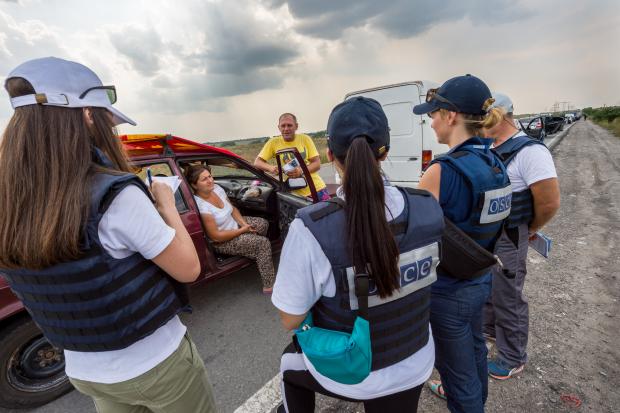Connecting Gender Equality to Peace and Security
On the occasion of International Women’s Day, OSCE monitoring officers serving as Gender Focal Points within the OSCE Special Monitoring Mission to Ukraine (SMM) talk about their daily contributions to gender equality and why the SMM is determined to connect gender equality to sustainable peace and security efforts.
The SMM Gender Focal Points promote gender equality within their teams and the mission and throughout the communities in which they work. The network includes members of both sexes who advise and support their SMM colleagues to ensure both men and women’s contributions and concerns are captured in mission reports and activities.
As research continues to indicate, no country has so far been successful in closing the gender equality gap. The OSCE recognizes that existing inequalities are often exacerbated during times of conflict and as such is doing all it can to support United Nations Security Council Resolution (UNSCR) 1325 on Women, Peace and Security. This landmark resolution calls for removing the barriers to women’s full participation in maintaining and promoting peace and security. The SMM Gender Focal Point Network was established in 2015 and includes a dozen mission members throughout Ukraine and a dedicated Gender Adviser based in Kyiv.
Marinka Franulovic is the Mission’s Gender Focal Point in Donetsk and is part of a 186-strong team including 32 other female colleagues. Despite their relatively small number, women are currently represented in nearly all the team’s units and the team benefits from their presence, as Marinka explains. “There have been instances when we approached local residents and asked them to share their concerns, including about human rights, and they specifically asked to speak with a female monitor.” As an example of how the SMM’s presence affects local women, Marinka tells us of Valentina, a 65-year-old school director in the town of Oleksandrivka. Her pupils need to pass armed soldiers on their way to school, which is continually shelled and surrounded by mines. Valentina tells how she tries to teach the children peace and friendship and notes that the presence of SMM monitors often brings hope to the community. The fact that the Donetsk SMM team is led by a woman, Olga Scripovscaia, has the added value of providing diversity to meetings with representatives of security structures dominated by men.
Matti Inkeroinen who serves as the focal point on gender mainstreaming in the SMM team based in Luhansk provides training to his colleagues on how the conflict impacts women and men differently. He tells the story of Nastya[1], for instance, the head of military medical services for one of the armed formations of the “Luhansk People’s Republic”. Nastya says that the main challenge for women in combat situations is “to adapt to the situation, get used to the atmosphere and to the poor living conditions”. She believes “women should stay calm and strong, since weakness is not tolerated.” As Matti’s SMM teammates come from various national and professional backgrounds, as well as from diverse cultural environments, deepening their understanding of gender equality issues requires more than a ‘one-size-fits-all’ approach. “Tailor-made gender training has a positive impact on the way patrols are conducted and reports written,” Matti says.
Annie Syrett is the Gender Focal Point in the team based in Sievierodonetsk. She shares a story showing the impact of last year’s OSCE 16-day End Violence Against Women campaign had on local women who participated. Three months after the campaign, Annie re-connected with a shopkeeper, who continued to wear the white ribbon she gave her at that time. “She told us that customers often ask her about the ribbon and she is happy to explain what it is about,” Annie says. “She clearly felt proud to wear the ribbon, and welcomed the discussions it generated. It’s a nice reminder that by reaching out to people we can help change perceptions on gender issues,” she adds.
Other parts of Ukraine also benefit from the Network’s efforts. Andrew Offenbacher, a Gender Focal Point in the country’s southern city of Kherson, explains that collecting gender- and age-specific data is essential as women, men, boys and girls may have different security concerns and needs. “Our reports need to accurately reflect how the conflict affects women and men differently”, says Andrew. “Women, for instance, are often overrepresented in communities of internally displaced persons, and reports indicate that elderly women are particularly vulnerable to experiencing economic hardship around the line of contact.” Andrew also spoke of Nataliya, the director of the NGO Information Resource Centre Legal Space in Kherson which provides free legal assistance to returned Ukrainian soldiers and their families. Nataliya feels strongly about the need for the increased involvement of women in the peace-building process as she knows from her own experience how important their involvement is. Despite being a key part of society, women are underrepresented at the higher political level, Andrew notes.
Looking ahead, Yvette Langenhuizen, the SMM Gender Adviser, points out that gender mainstreaming will continue to require constant attention. “The Gender Focal Point Network will continue to build on its achievements”, Yvette says. She highlights the importance of the SMM’s co-operation with civil society groups and international organizations to advance gender equality. “UNSCR 1325 urges us to look at more inclusive, and therefore more effective, security approaches. Integrating the concerns and contributions of both women and men into our peace and security efforts will lead to more effective and sustainable outcomes,” she said.
[1] pseudonym



